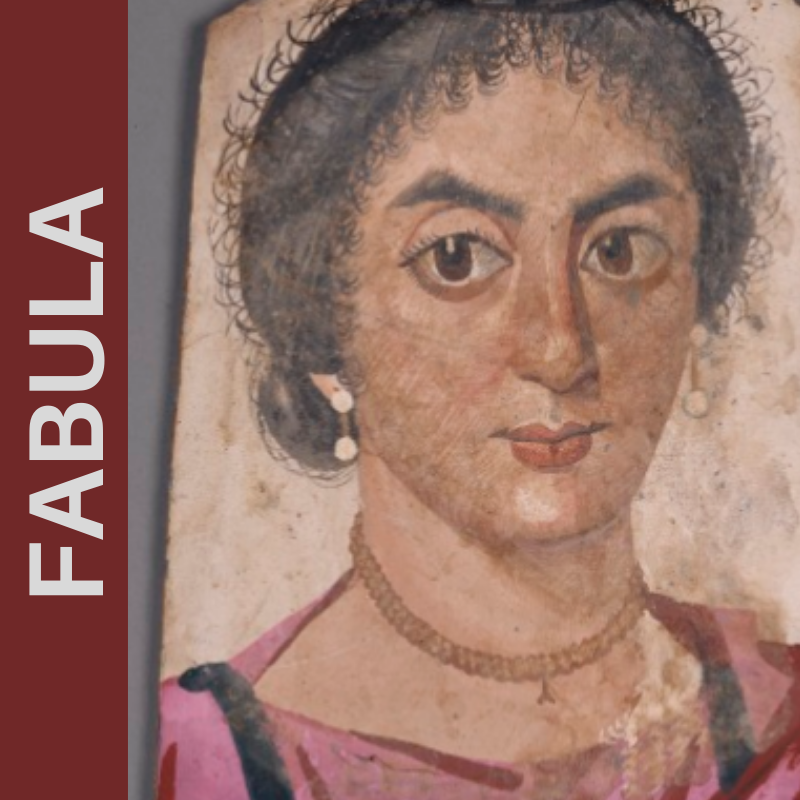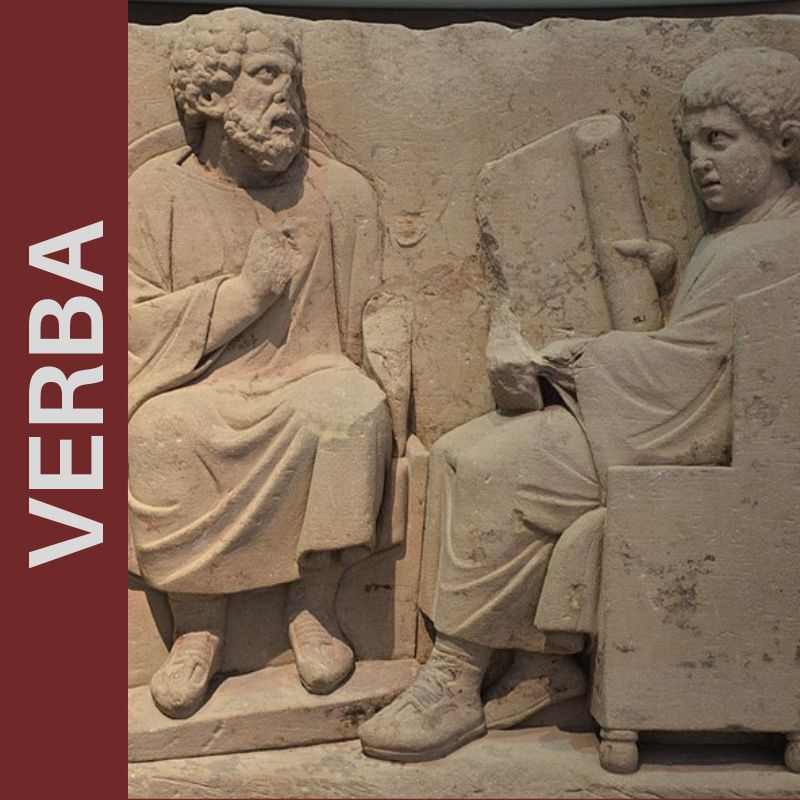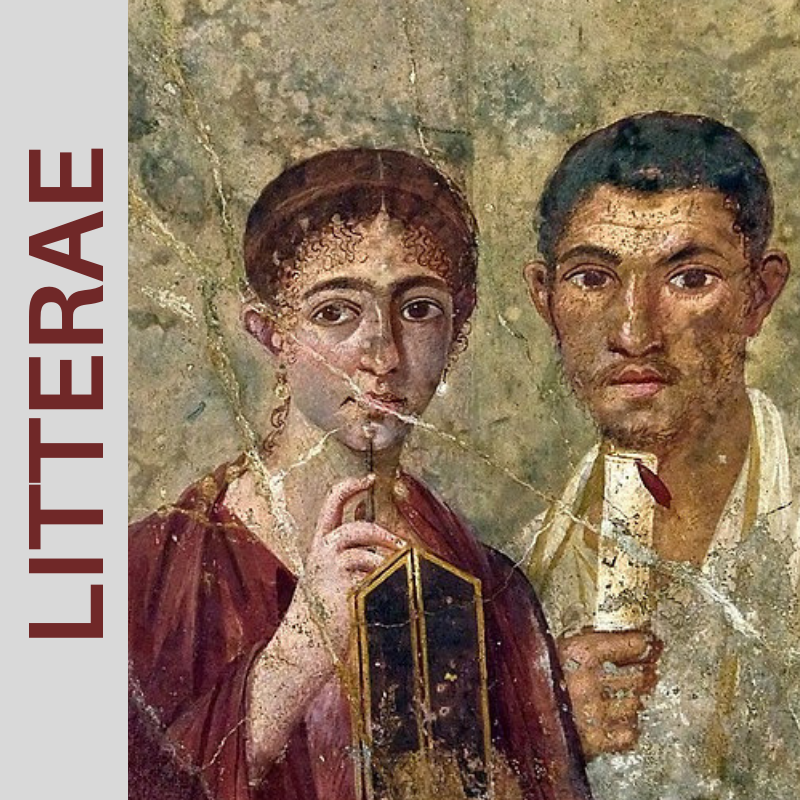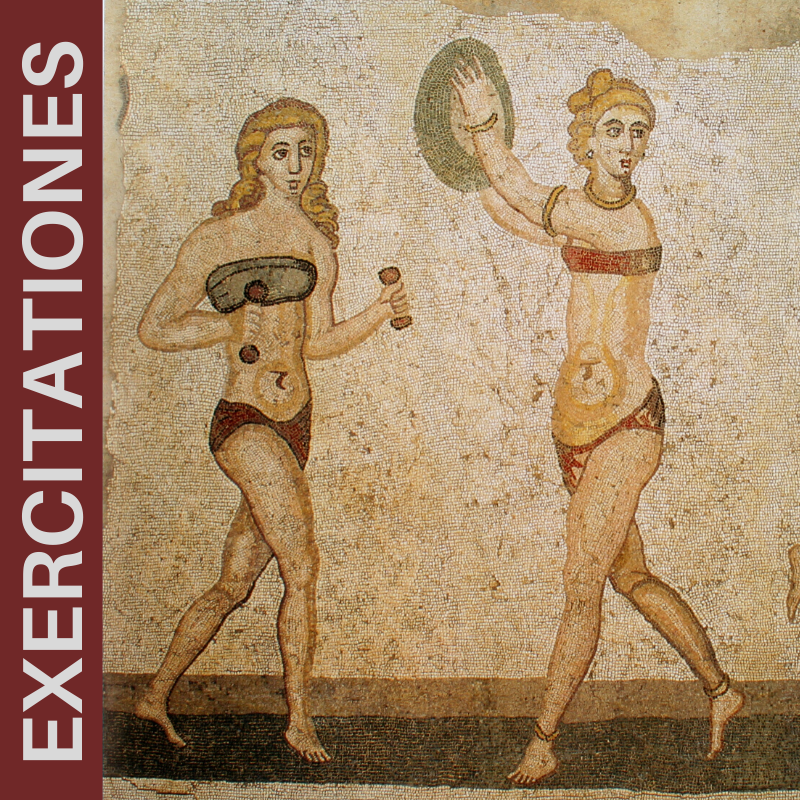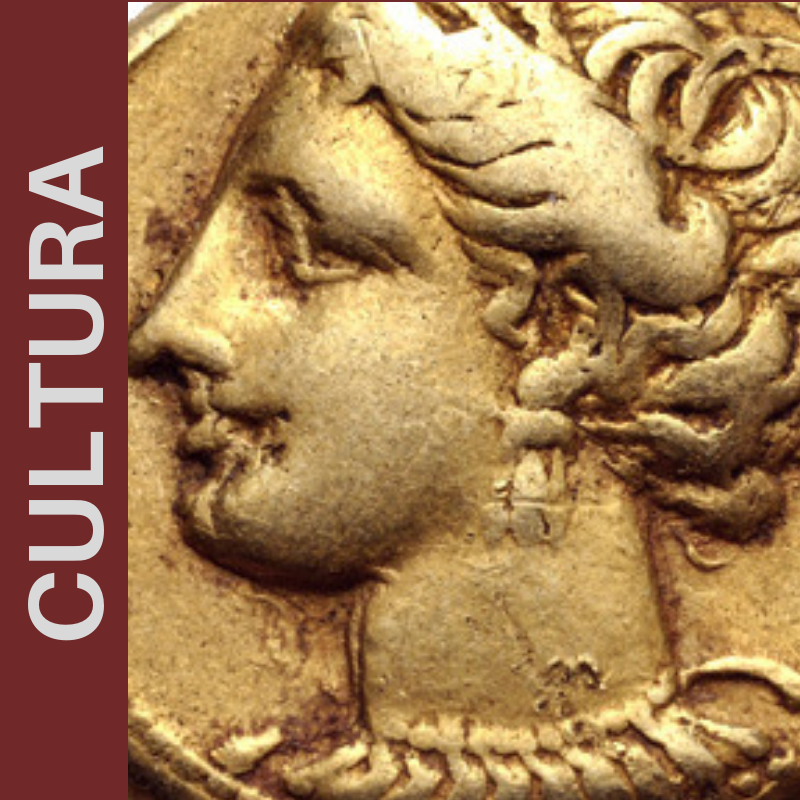A
Cato Prays to Jupiter and Janus
(adapted from de Agri Culturā 134)
Da vinum Iano Iovique Iunonique, ante porcam magnam sacrificabis. Da Iano tua frumenta sacra atque dic ea verba: "Iane pater, tibi ea frumenta do et bonas preces dico. Effice bona mihi liberisque meis domoque familiaeque meae." Da Iovi frumenta atque dic: "Iuppiter, tibi ea frumenta do et bonas preces dico et honorem multum tibi dabo. Effice bona mihi liberisque meis domoque familiaeque". Post da Iano vinum et dic verba sancta: "Iane pater, tamquam tibi honorem donis dabam, ita sacro vino honorem dabo.” Deinde sacrifica porcam magnam.
Nota
Cato the Elder (234-149 BCE) was a statesman and historian known for his conservatism. He worked to preserve Romanitas, against corrupting influences outside of Rome. Like most wealthy Romans, he was also a “gentleman farmer.” He recorded his advice in the book On Agriculture. In this passage, he tells the reader how, what, and when to sacrifice in order to keep his household safe.
Iano: Ianus, -i m. - Janus (the Roman god of doorways, gates, and transition. January is the transition to the new year, for example).
Iovique: Iuppiter, Iovis, Iovi, Iovem, Iove - Jupiter (the Roman god of the sky, thunder, oaths, and other spheres of power)
Iunonique: Iuno, Iunonis f. - Juno (the Roman goddess of marriage, motherhood, and war).
porcam: porca, -ae f. - pig (female)
sacrificabis: sacrifico, -are, -avi, -atum - to sacrifice
tamquam: “just as”
honorem: honor, honoris m. - honor
B
Tibullus Calls upon His Ancestral Lares for Protection and Peace
(adapted from Tib. 1.10)
Lares patris me semper servate: vos me alebatis ubi tener puer in domo ante vos cucurri. Sedes veteres mei avi coluistis. Deinde viri bonam fidem tenebant, cum ligneae imagines in parvā aede stabant. Is deus erat beatus, si paterfamilias ei vinum vel flores dedit. Vir pauper multis precibus vos accedebat, et filia parva cum eo frumenta sacra ad vestram aedem portabat. Omnes preces audite, Lares, et accipite iam porcum rustici frumenti plenum. Eum vobis opere parabo et cum veste purā perveniam. Vobis ita placebo: cedite mihi dona et vetate bellum de terrā nostrā.
Albius Tibullus (55 -19 BCE) wrote two books of poems. The second book is incomplete. There are third and fourth books of poems attributed to him, however they are likely not his. In this poem, Tibullus is nostalgic for a time when offerings to the household gods (Lares) were simple. He makes offerings to the gods and includes a request to keep him out of battle.
Lares: Lares, Larium m. pl. - Lares (Roman household gods)
servate: servo, servare, servavi, servatum - to save, watch over
alebatis: alo, alere, alui, altum - to nourish
puer: puer, pueri m. - boy
cucurri: curro, currere, cucurri, cursum - to run
sedes: sedes, sedis f. - abode
avi: avus, -i m. - grandfather
fidem: “faith” (acc. sing. fem.)
cum: “when” (you will learn this use of “cum” as a conjunction in Unit 3)
ligneae: ligneus, -a, -um - wooden
stabant: sto, stare, steti, statum - to stand
paterfamilias: paterfamilias, -ae f. - paterfamilias (male head of the Roman family)
vel: “or”
pauper: pauper (gen. pauperis) - poor
accipite: accipio, accipere, accepi, acceptum - to receive
porcum: porcus, -i m. - pig (male)
rustici: rusticus, -a, -um - rustic, from the country
purā: purus, -a, -um - clean, plain, pure
bellum: bellum, -i n. - war
C
Four Hundred Innocent Enslaved People are Executed
(adapted from Tac. Annales 14.42-45)
Servus dominum, praefectum urbis, Pedanium Secundum, interfecit; aut ex irā quia dominus libertatem eius vetabat, aut ex odio quia virum eundem amabant neque servus potuit aemulum tolerare. Ex more veteri non solum is servus poenam acrem dat, sed etiam familia omnis. Secundus habebat quadringentos servos. Populo autem Romano non placuit, itaque viri pleni irae ad senatum cum armis cesserunt. Dixerunt, “Tam multi servi propter crimen unius servi mori non debent.” Leges etiam in senatu mutare cupiebant. Multi tamen eorum legem habebant certam. Ea sententia vicit. Itaque milites servos omnes interfecerunt inter verba acria et lacrimas populi.
Publius Cornelius Tacitus (56 - 120 CE) wrote the history of Rome from the death of Augustus to the death of Domitian in his works The Annales and The Histories. He is likely from one of the provinces and at times he shows sympathy for leaders who stood up to the empire. In this passage from the Annales, the Roman people protest the cruel punishment mandated by custom when one enslaved person kills the head of the household.
praefectum: praefectus, -i m. - prefect (the praefectus urbis was a position of leadership in Rome, whose powers changed throughout the empire)
Pedanium Secundum: Pendanius Secundus, Pedanii Secundi m. - Pedanius Secundus
odio: odium, -i n. - hatred
eundem: “the same” (modifies virum)
aemulum: aemulus, -a, -um - rival
tolerare: tolero, tolerare, toleravi, toleratum - to bear, tolerate
more: mos, moris m. - custom
non solum...sed etiam…: “not only… but also…”
poenam: poena, -ae f. - punishment (poenas + a form of do, dare, dedi, datum = to pay the penalty)
quadringentos: quadringenti, -ae, -a - four hundred
Populo: populus, -i m. - people
armis: arma, -orum n. pl. - arms, weapons
crimen: crimen, criminis n. - crime
unius: “of one” (modifies servi)
mori: “to die”
Leges: lex, legis f. - law
senatum: senatus, -us m. - senate (abl. sing.)
mutare: muto, mutare, mutavi, mutatum - to change
sententia: sententia, -ae f. - opinion
vicit: vinco, vincere, vici, victum - to win
milites: miles, militis m. - soldier
inter: inter - among (+ acc.)
lacrimas: lacrima, -ae f. - tear
D
A Prostitute Reunites her Lover with his Wife
(adapted from Terence Hecyra 834-40)
Beata sum quia meus amator propter me beatus est. Propter me uxorem suam amat. Multae nostrarum meretricum id non facient; nam, non est bonum nobis si amator noster suam uxorem nimis amat. Sed ego propter pecuniam mala numquam faciam. Dum is vir erat mihi, cognovi eum esse bonum et tenerum. Matrimonium eius tamen venit incommode mihi—-est certum. At necesse est multa incommoda ferre pro viro bono.
Publius Terentius Afer (185/195 - 159? BCE) was born into slavery in North Africa. His cognomen suggests that he was a Berber from Libya. He was purchased by Publius Terentius Lucanus, a Roman senator. Lucanus was so impressed with Terence’s literary abilities that he freed him. Terence went on to write six comedic plays. In this passage from Hecyra, a prostitute explains why she has helped one of her lovers reunite with his wife.
amator: amator, amatoris m. - lover
meretricum: meretrix, meretricis f. - prostitute
nam: nam - for (conjunction)
nimis: nimis - excessively
mala: malus, -a, -um - bad, evil
dum: dum - while
matrimonium: matrimonium, -i n. - marriage
incommode: incommodus, -a, -um - inconvenient (incommodē - adverb)
necesse est: “it is necessary”
ferre: “to bear”
Except where otherwise noted, material by Roman and Beyond: a Latin Curriculum is licensed under a Creative Commons Attribution-NonCommercial-ShareAlike 4.0 International License.
